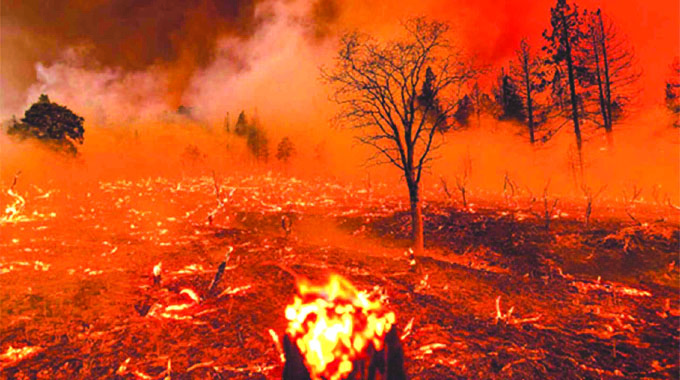Preventative measures to curtail veld fires needed urgently

Sheuneni Kurasha
Farmer’s Diary
The spectre of veld fires looms large in the country, especially in the face of severe drought this year. The fires often started accidentally or through negligence, wreak havoc on the environment, agriculture and communities, leaving farmers in misery and anguish as vast tracts of grazing land are destroyed, livestock perish, and, in some instances, property and human life are not spared.
While the statutory veld fire season in Zimbabwe stretches from July 31 to October 31 each year, and this year there is need to act early, swiftly, and decisively in light of the ravaging climate change-induced drought.
It is imperative to ensure an all-stakeholders approach in undertaking robust pre-fire suppression measures to mitigate the devastating effects of veld fires, which have been responsible for an annual average burnt area of 1 million hectares in the country in recent years.
Ahead of the annual education and awareness campaigns during the second week of May, this column is dedicated to raising the alarm and rallying the farming community and the entire country to face the monster of veld fires head-on and take precautionary measures to prevent the scourge.
Zimbabwe, like many other countries in the region and across the continent, has been grappling with the burden of recurrent droughts. The droughts have escalated in severity and frequency, exacerbating the risk of veld fires.
The combination of dry vegetation, high temperatures and erratic rainfall creates the ideal conditions for these fires spread rapidly across vast tracts of land, leaving destruction in their wake.
The economic and environmental consequences of veld fires are far-reaching and severe. The fires not only destroy crops, forests, grazing land, livestock, and property, but also endanger biodiversity, water sources and air quality.
The loss of livelihoods, infrastructure and natural resources exacerbates poverty and hampers sustainable development efforts. Moreover, the costs associated with firefighting and post-fire rehabilitation strain already limited resources on the part of farmers and the Government, diverting funds from other urgent needs.
Veld fires also pose significant challenges to rangeland management for farmers.
They decimate grazing land, depriving livestock of essential forage and water sources. This loss not only threatens the survival of livestock but also undermines the resilience of pastoral communities that depend on rangeland resources for their livelihoods.
Veld fires also contribute to erosion and soil degradation by stripping away vegetation cover and exposing soil to erosion. The erosion of topsoil often has long-term implications for agricultural productivity and ecosystem health, exacerbating food insecurity and environmental degradation.
Furthermore, veld fires create conditions conducive to the proliferation of invasive plant species, which can outcompete native vegetation and disrupt ecosystem dynamics. Controlling invasive species requires concerted efforts and resources, further complicating rangeland management strategies for most farmers.
Given the adverse economic and environmental consequences of veld fires, it’s evident that prevention is always better than cure. It is therefore imperative for the country to adopt a collaborative approach involving various stakeholders in implementing pre-fire suppression measures.
It is a good practice for every farmer to undertake fire risk audits ahead of each fire season to identify risk areas, including possible causes of fire and take appropriate preventative measures. Another key strategy in tackling veld fire challenges is public awareness and education within communities regarding the dangers of veld fires and the promotion of responsible fire management practices.
This proactive approach can significantly reduce the incidence of accidental fires. Educating people on the safe use of fire for agricultural purposes and emphasising the importance of early detection and reporting of fires can ultimately save lives and livelihoods.
Fireguards and controlled burning have proven to be highly effective and cheaper fire control measures. By creating firebreaks, which are cleared areas designed to
contain fires, farmers can prevent the spread of veld fires and protect their pastures and property.
Additionally, controlled burning during the cooler months can reduce fuel loads and mitigate the risk of intense fires during the dry season.
The engagement and involvement of local communities in fire management efforts are crucial. Community-based fire management programmes have proven to be effective in empowering residents to take ownership of fire prevention and response initiatives.
This fosters a sense of responsibility and overall stewardship towards the environment. Indeed, preventing veld fires must be a collective responsibility for all stakeholders because once ignited, fires can quickly spread across farms and communities.
Through community involvement, farmers should consider establishing fire-fighting committees and teams in their farming areas.
Such committees should not only lead efforts in fighting veld fires when they occur but also educate communities on best fire prevention and suppression methods. In our farming area, we have mobilised the youth to actively participate in these committees and to ensure swift response fire alerts and coordination in firefighting efforts. Investment in firefighting equipment is crucial for effective fire suppression. The firefighting equipment should be fully serviced and ready before the onset of the fire season.
This equipment includes fire fighting hoses, portable fire pumps and tanks, beaters, fire hose reels, nozzles, among others. Whistles and bells should also be available for farmers to use in alerting each other and other farm occupants and neighbours whenever there is a veld fire outbreak. Such equipment must be stored where it is easily accessible in times of need. Strengthening firefighting capabilities at both the national and local levels improves the capacity to respond swiftly to veld fires and prevent them from escalating.
In conclusion, the urgent need for collective action in preventing veld fires cannot be overstated, especially considering the severe drought and the significant impact of these fires on farmers as well as the economy and the environment.
Sheuneni Kurasha is the Managing Director of Chivara Farm in Beatrice, a diversified farming operation, which specialises in stud breeding for small livestock (Boer goats, Kalahari Red goats, Damara sheep, and Meatmaster sheep) as well as Boran cattle. For feedback, kindly get in touch by email: [email protected]; X:@chivarafarm or WhatsApp: +263 772 874 523.









Comments